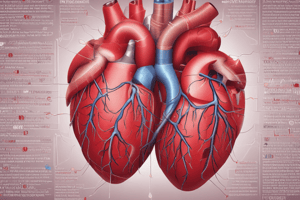Podcast
Questions and Answers
What criteria define Stage A heart failure?
What criteria define Stage A heart failure?
- Patients at high risk for developing left ventricular dysfunction but without structural heart disease or symptoms of HF. (correct)
- Patients with LV dysfunction or structural heart disease who have not developed symptoms of HF.
- Patients with refractory end-stage heart failure requiring specialized interventions.
- Patients with LV dysfunction or structural heart disease with current or prior symptoms of heart disease.
Which characteristics are associated with Stage A heart failure?
Which characteristics are associated with Stage A heart failure?
- HTN, atherosclerotic disease, diabetes, obesity. (correct)
- Symptoms despite maximal medical therapy, recurrent hospitalizations.
- History of myocardial infarction, left ventricular hypertrophy, low ejection fraction.
- Shortness of breath, fatigue, decreased exercise tolerance.
What is the recommended treatment for Stage A heart failure?
What is the recommended treatment for Stage A heart failure?
- End of life care, extraordinary measures.
- Risk factor control, ACE inhibitor or ARB. (correct)
- Implement Stage A recommendations plus: beta-blocker.
- Diuretics, sodium restriction, implantable defibrillator.
What criteria define Stage B heart failure?
What criteria define Stage B heart failure?
What patient characteristics are indicative of Stage B heart failure?
What patient characteristics are indicative of Stage B heart failure?
What treatment is suggested for Stage B heart failure?
What treatment is suggested for Stage B heart failure?
What are the criteria for Stage C heart failure?
What are the criteria for Stage C heart failure?
Which characteristics are seen in patients with Stage C heart failure?
Which characteristics are seen in patients with Stage C heart failure?
What treatment protocols are recommended for Stage C heart failure?
What treatment protocols are recommended for Stage C heart failure?
What patient characteristics define Stage D heart failure?
What patient characteristics define Stage D heart failure?
Which characteristics might Stage D patients exhibit?
Which characteristics might Stage D patients exhibit?
What treatment options are included for Stage D heart failure?
What treatment options are included for Stage D heart failure?
Study Notes
ACC and AHA Classification of Heart Failure
-
Stage A: Patients at high risk for developing left ventricular dysfunction, with no structural heart disease or symptoms.
-
Stage A Characteristics: Includes patients with hypertension, atherosclerotic disease, diabetes, and obesity.
-
Stage A Treatment: Focuses on risk factor control and may include ACE inhibitors or ARBs.
-
Stage B: Patients exhibit left ventricular dysfunction or structural heart disease but show no symptoms of heart failure.
-
Stage B Characteristics: Commonly includes individuals with a history of myocardial infarction, left ventricular hypertrophy, and low ejection fraction.
-
Stage B Treatment: Incorporates all recommendations from Stage A, with the addition of beta-blockers.
-
Stage C: Patients with left ventricular dysfunction or structural heart disease who experience current or prior symptoms of heart failure.
-
Stage C Characteristics: Notable symptoms include shortness of breath, fatigue, and decreased exercise tolerance.
-
Stage C Treatment: Builds on recommendations from Stages A and B, adding diuretics, sodium restriction, implantable defibrillators, and cardiac resynchronization therapy.
-
Stage D: Represents patients with refractory end-stage heart failure requiring specialized interventions.
-
Stage D Characteristics: Symptoms persist despite maximal medical therapy, leading to recurrent hospitalizations.
-
Stage D Treatment: Involves all previous recommendations from Stages A, B, and C, plus end-of-life care and potential extraordinary measures such as cardiac transplantation or mechanical support.
Studying That Suits You
Use AI to generate personalized quizzes and flashcards to suit your learning preferences.
Description
Test your knowledge on the ACC and AHA classifications of heart failure. This quiz covers the definitions, patient characteristics, and treatment recommendations for different stages of heart failure. Perfect for healthcare professionals and students alike!




